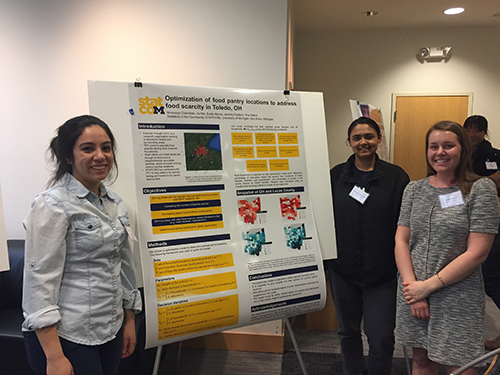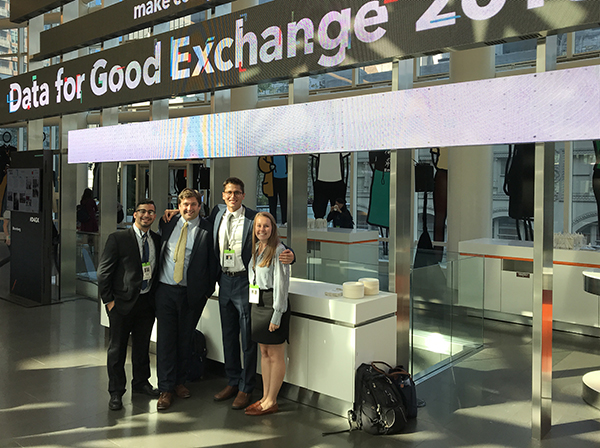Learning Through Service

STATCOM
STATCOM Provides Pro-Bono Statistical Consulting for Nonprofits
Statistics in the Community (STATCOM), a student-led organization based at the University of Michigan School of Public Health, provides pro-bono statistical consulting for governmental and nonprofit organizations.
In the 12 years since its founding, STATCOM has assisted with over 40 projects for nonprofits and now involves more than 100 students in multiple departments and schools within the university working on up to a dozen active projects at any point in time. STATCOM's work ranges from local health departments to city governments to programs for food security and the elderly and recently began partnering with the Community Technical Assistance Collaborative (CTAC) at the Ginsberg Center to assist public policy students with data analysis.
Fatema Shafie, an MS candidate in biostatistics at Michigan Public Health, is working on a project with the Detroit College Access Network (DCAN), a coordinating body of leaders and organizations in Detroit that helps ensure all Detroit students have opportunities to attend college. One of DCAN’s signature support services for high schools in Detroit, the college advisors program, trains recent college graduates as college advisors and embeds them in local high schools. The advisors support seniors one-on-one with their enrollment in postsecondary education and run workshops that teach students about the processes of applying for college, such as soliciting recommendations from teachers and completing the FAFSA.
“DCAN is looking to expand the advisors program and apply for additional funding, so we’re working with them to assemble quantitative evidence to demonstrate how well the program is working,” Shafie said. “Are scores going up? Are more students enrolling in college since the program began? This is my first STATCOM project, and I’m excited to be building this good relationship with a community partner.”
“Schools and the city government collect a lot of data, but we never have enough people
to analyze it. The college advisors program involves some city-wide data comparisons,
and it’s fantastic to be working with such knowledgeable students to assess such a
complex data set.”
—Ashley Johnson, DCAN Executive Director
Much of the data Shafie and her peers need for this project is publicly available. But the challenge is to find and date it before merging it into a usable form—skills they hone in the classroom setting as well. “In addition to working with what’s there,” she said, “we're looking at biases in the data, like assessing qualitative differences between schools that apply for advisors and those that don't.”
Ashley Johnson, DCAN’s executive director, said her organization works with large amounts of information at all levels, from school-level to citywide data. “Schools and the city government collect a lot of data, but we never have enough people to analyze it,” she said. “The college advisors program involves some citywide data comparisons, and it’s fantastic to be working with such knowledgeable students to assess such a complex data set.”
For Shafie, the reciprocal nature of these relationships is the real beauty of STATCOM. “It's like an internship, with customer-based, problem-solving experience that will translate well to the job application and interview process, not to mention the actual data-crunching skills we are acquiring. And all of that follows the simple fact that we’re helping people and helping communities” she said.

NeCamp’s most current STATCOM collaboration is the Washtenaw County Older Adults project, a survey conducted by the Ann Arbor Area Community Foundation (AAACF) that assessed quality of life and social connectedness in seniors across the county. "With this project, we worked with multiple organizations—the county itself, AAACF, the Ralph C. Wilson Foundation—which gave us a chance to show the larger community what we can do and to get our name out there a little bit,” he said. “Hopefully, that turns into additional volunteer opportunities down the road. We want organizations with projects to know about and seek out our services!”
NeCamp has engaged on projects with Ann Arbor public schools, Food Gatherers, and several other projects arranged through CTAC partnerships. “In many cases, these partnerships do not end with that first presentation of results. Initial results often lead to new questions that we then tackle together right away. Or the project lies dormant for a while but down the road our partner contacts us again with a new idea for how to use previous data sets,” NeCamp said.
“We get a lot of support from STATCOM throughout, from both student and faculty leaders. Cathy Spino, one of our faculty advisors, came to our first meeting with DCAN to ensure everyone felt comfortable with the process and that we students were asking the right questions about the data, anticipating problems we might have, and setting up the entire process in the most helpful way,” Shafie said.
STATCOM recently won the university’s Student Leadership Professional Organization of the Year award. The mutual benefit of a community-based learning model that serves student, school, and society is a hallmark of STATCOM and one of the main reasons they are a leading professional development organization for students at the University of Michigan.

